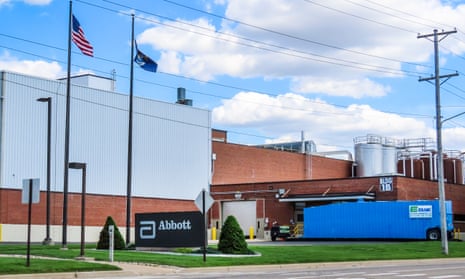The baby formula manufacturer Abbott announced that it would resume production at a key Sturgis, Michigan, plant on Saturday, months after a shutdown at the facility spurred a nationwide shortage. The company in February recalled baby formula made at that plant, after four infants who consumed products from there developed bacterial infections, with two of the babies dying.
Food and Drug Administration officials said they had encountered Cronobacter sakazakii bacterium at this plant. FDA and Centers for Disease Control and Prevention testing determined the genetic sequence of these Cronobacter did not match that of bacterium in these infants – meaning they did not find a connection to Sturgis, CNN reported.
In May, a federal judge greenlit an agreement between Abbott and federal officials that paved the way for production to resume at its Sturgis plant; the deal included a requirement that the company clean and sanitize the facility. Abbott said none of its baby formula that was distributed to consumers returned positive for Cronobacter or salmonella tests, per CNN.
“We understand the urgent need for formula and our top priority is getting high-quality, safe formula into the hands of families across America,” Abbott said in announcing production at Sturgis. “We will ramp production up as quickly as we can while meeting all requirements.
“We’re committed to safety and quality and will do everything we can to re-earn the trust parents, caregivers and health care providers have placed in us for 130 years.”
Abbott said it was starting to make Elecare “and other specialty and metabolic formulas”. Elecare is expected to be distributed to consumers about 20 June.
“We’re also working hard to fulfill the steps necessary to restart production of Similac and other formulas and will do so as soon as we can,” Abbott said.
The company said that it sent “millions of cans” of baby formula to the US from its factory in Cootehill, Ireland, and “prioritized” formula production at its Columbus, Ohio, plant.
Abbott’s announcement comes amid federal efforts to address the formula shortage. Joe Biden used the Defense Production Act to increase production and authorize flights importing formula from abroad.
One military flight from Germany to Indianapolis delivered about 35 tons of formula “for moms and dads who have children who have allergies where the regular formula just simply will not work”, Tom Vilsack, agriculture secretary, previously said.
The formula crisis has worsened, however, with Bloomberg reporting that the national out-of-stock rate was 74% for the week concluding 28 May. The FDA commissioner, Robert Califf, said on 26 May that shelves probably would not be stocked until late July, according to CNBC.
The Biden administration has voiced support for more competition in the domestic formula industry, which is controlled by just a few companies.
“It goes back to this question of how we can bring more competition in our economy, have more providers have this formula so that no individual company has this much control over supply chains,” said Brian Deese, the director of the White House national economic council.
